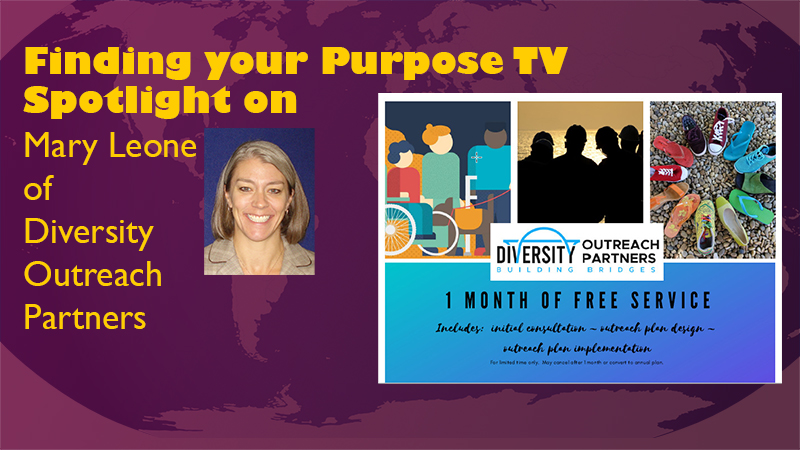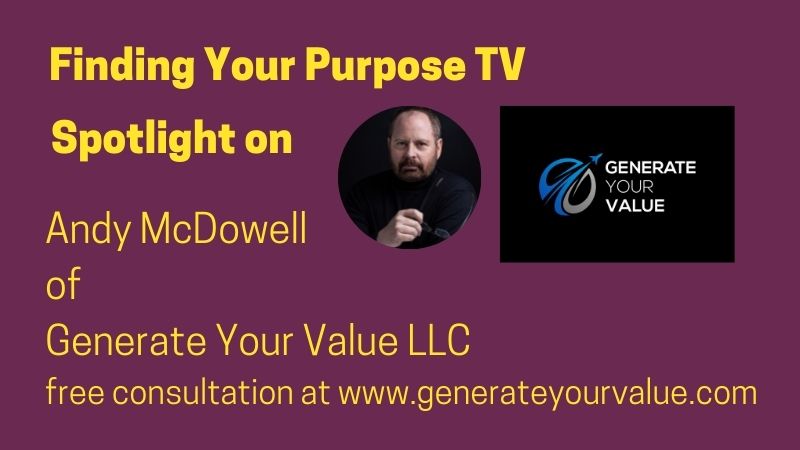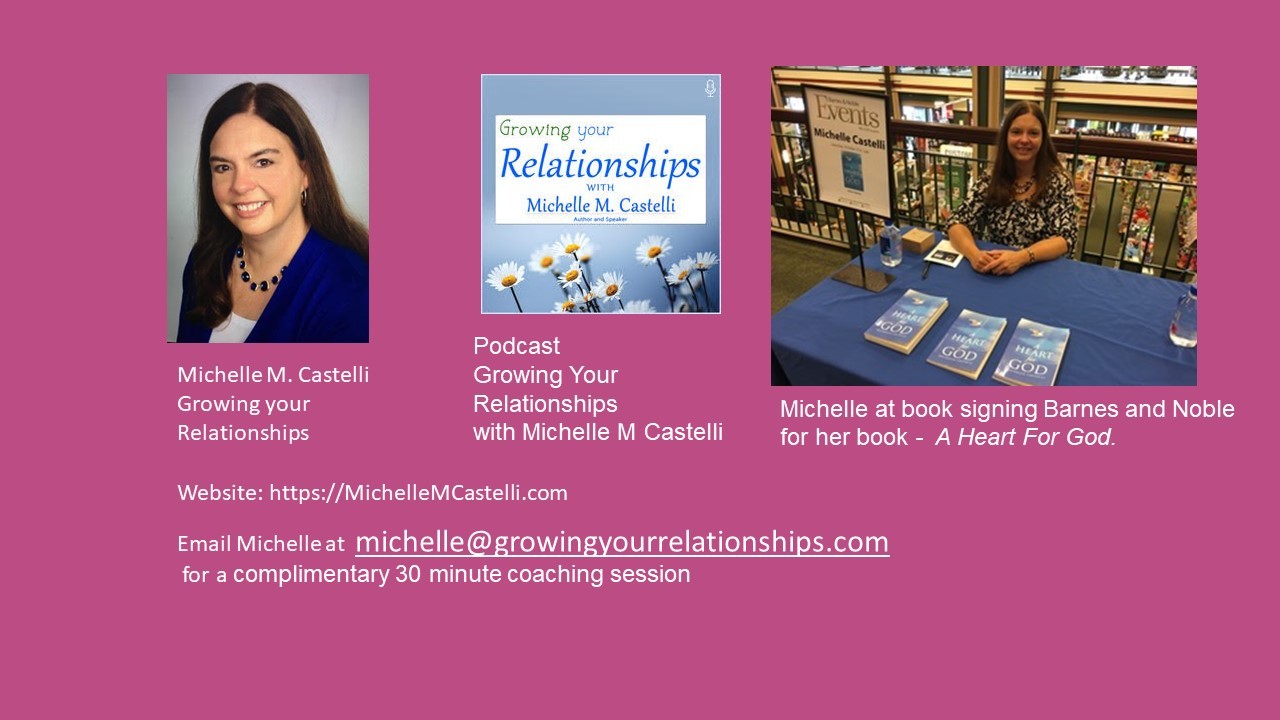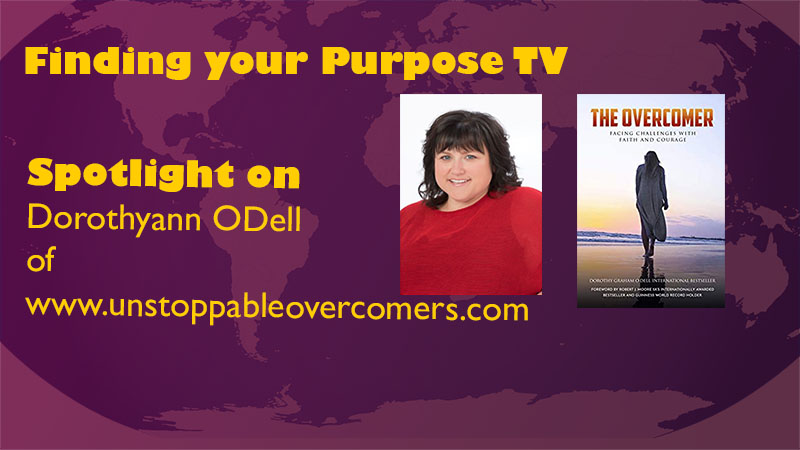Jane
Welcome everybody. This is Jane Gardner of finding your purpose TV, and today on spotlight, where we talk to purpose-driven entrepreneurs, we have Mary Leoni of diversity outreach partners, and Mary is a talent acquisition leader with a passion for diversity recruiting. And that includes people with disabilities and veterans. So, Mary, I think I’ll let you talk more about the business and how you were doing that. And as I have a personal interest in finding out what your journey was and getting to where you are now.
Mary
Thank you for having me on Jane. I appreciate it. I’m looking forward to this
Mary
So to tell you a little bit about my journey, back at the end of last year, I had made a decision that I wanted to find my and follow my passion. So my passion is diversity recruiting, and that includes people with disabilities as well as transitioning veterans. And what I did is I ended up leaving my company in March, right before COVID not realizing that was going to happen. I was introduced through my networking efforts to my business partner, Alan Chapman and we formed diversity outreach partners this summer. And so we’re really excited. Diversity outreach partners helps companies build bridges. So for a lot of companies that do affirmative action plans, and these could be government contractors, or they could be subcontractors. A lot of times they do their affirmative action plan and they literally, they put it on the shelf and they don’t look at it again until the next year. And so what we can do is we can help them with our outreach efforts and when they have gaps in their affirmative action plan for females, for people with disabilities, for veterans or minorities, we can actually actually help them build the bridge to organizations that can help them with closing those gaps. And so we can be that outreach partner and we can help them with, improving that candidate flow as well as developing those relationships with the diversity organizations. So we’re pretty excited.
Jane
I’m very interested in how you got to where you are today, because when you went to university, I’m sure you didn’t think you’d be doing this, that you’re doing now.
Mary
That is a really great question. And, and that is completely true. in my last role, when I was looking for my next position, I actually got an offer from Texas instruments that I couldn’t refuse, and I was offered to help them rebuild their compliance program. And at that time that was back in 2013. And, at that time they, the government was introducing some new regulations and that included a focus on people with disabilities, as well as transitioning veterans. And so those two things just, I just really fell in love with those two areas, the diversity recruiting front, I was able to help the talent acquisition or, organization. one of the things that Texas instruments does is they do quite a bit of external hiring at the campus level. And so I actually put together a very large, effort to reach out to the, the various target schools to find who are the, who are the, organizations and who are the schools that are doing the best job on the students with disabilities, as well as student veterans. And then I put together a heat map. I came up with a strategy and we started implementing. And so I just kind of fell in love with those two areas. And I knew I wanted to do diversity recruiting. And so I made the decision to, to leave the company and to, set off on my own journey. I was really looking for a large company to work for that was either focused on growing or building their program that included veterans or people with disabilities. And then I fell into this opportunity. I networked and I met my business partner, Alan, and we decided to start diversity outreach partners. So it’s kind of exciting. I actually volunteer with two other organizations. One’s very disability focused and one is veterans focused. And so that has helped me with, learning best practices as well.
Mary
I, I actually have, I’m , I have a couple of different roles in veterans organization as called Vets. The number two, and then industry and the founder actually had put it together about a year ago. We actually have overwhelmed over 20,000 followers on LinkedIn already. There’s well over a hundred volunteers, in the organization as well. And every three weeks we have a networking event. And what that does is it gives the transitioning veterans an opportunity to practice networking in a safe space. There’s always a high level transitioned, military person, war veteran service organization leader, to be able to share some key messages and learnings from their journey. And then what we do is we break into networking rooms and I’m one of the networking facilitators. We actually had our first military spouse event yesterday. So the, the organization isn’t just focused on transitioning veterans, it also helps military spouse. It helps gold star families and it helps, other advocates as well. And so it’s a great, great organization. I’ve met some wonderful people and, it, it really has helped me on my journey and I’ve, I’ve learned so much about, coaching people one-on-one to be able to help them achieve what they want and find their next job after they’ve transitioned from the military. So it’s fun. I do a lot of one-on-one coaching as well through that effort.
Jane
could you repeat the name of the, the veterans Is it just LinkedIn, maybe just spell it out for us just in case anyone’s listening in I’m sure. Yeah. That would be great. And getting what they need, the help.
Mary
Yep. It’s vets V E T S the letter TWO. And then in this industry.
Jane Oh, awesome.
Mary
It’s on LinkedIn. Yep. It’s on LinkedIn and, it’s, it actually is a webpage as well. And so you can go in and there are actually 40, if you can believe this 45,000 veterans service organizations that are there to help transitioning veterans. And, this organization is put together so that it can library or catalog all 45,000 of them are free for people. So think of it as a resource page, but then, another benefit is the networking meetings that we have every three weeks. And we have, we’re expecting over 500 people to register for the one that comes up on Saturday. So it’s a pretty big, pretty, pretty big deal and a pretty big effort. We’ve really touched a lot of people.
Jane
Wow. That’s great. Yeah. So, so, so what do you do, for the actually for the companies in your business you’re, you’re looking at obviously starting to do that and, and what do you do for them in terms of, I mean, obviously, you know, lots of veterans because you volunteer quite a bit, so
Mary
Yeah. Yeah. so it’s, it’s actually more of building bridges with organizations. So it’s allowing that it’s first of all, doing a consultation with a company to understand what are their gaps. So do they have gaps on the female side Do they have gaps for minorities. Do they have gaps for people with disabilities or veterans. And then based on that consultation and that analysis, what we do is we look at the organizations that we’ve already, we’ve already started establishing relationships with either on a national or regional or a local level. And we do introductions. We put together a plan on what makes sense for the company. So maybe they have engineers, maybe they have machine operators, maybe they have, nurses, whatever it is. We can look at our organizations and if we don’t have any, then we can find new ones so that we can build those relationships for the company so that they can close those gaps. Because at this point, everybody is wanting to increase their diversity and, affirmative action. Actually, if you’re, if you’re following the affirmative action rules, this is one of the requirements is you need to do those outreach efforts to organizations. And if you don’t get the results that you want to close those gaps, then you actually have to do new efforts. And next year you can’t just do the same things year after year and not make any changes.
Jane
Oh, wow. Yeah. Yeah. So you, you obviously, you have some experience with veterans and, you’d like to maybe talk about veterans in transition. you’ve already mentioned you work with, a networking organization, so, so what else do you do.
Mary
Yep. I’ve actually reached out to several different veterans organizations, but the one that I volunteer the most and it’s, you know, it’s probably at least five to 10 hours a week with that’s that’s to industry. and, and what I, what I do on the side after I meet people at the networking events is I offer to meet with them and I do one-on-one coaching. So if somebody is in transition, maybe they’re six months away from leaving the military, maybe they’re 12 months and they want to try and get a handle on, target companies. They have some questions about how to interview. They have some questions about what is this type of role. Do, do you have any connections that you can introduce me to, to do an informational interview And I’m able to be able, I’m able to provide some of that information just because I’ve, I’ve done this so much in terms of coaching people through that, but I’ve, I’ve also made a lot of contacts. And so it’s, it’s, it’s fun. I really enjoy it. And it’s very fulfilling and I get a lot out of the coaching sessions as well.
Jane
Wow. Yeah. And you were mentioning that you also, wanted to talk about, disability employment and, and, and definitely, you know, how we should be employing more sure. Yeah.
Mary
Yep. So one of the organizations that I also volunteer with and I’m the vice chair is called disability in North Texas. And the national organization is called disability in and is three-pronged. first it encourages employers to employ and build programs that employ people with disabilities. It also has a vendor component where they have a certification program for disability owned business enterprises. And then it also has kind of a marketing component as well. The focus that we have for disability in North Texas, which is based in the Dallas Fort worth area, is to encourage more employers to, build and grow their programs, employing people with disabilities. So on a regular basis, at least once a quarter, if not more frequently, we have panelists, we have speakers, we have share best practices. We do networking. We have tours all to encourage people to share how have they been successful and what else can they do And what else can they implement Cause a lot of times, the effort for employing people with disabilities is farther behind than the veterans effort is. And so we can learn a lot of lessons from them. And so what I often tell people is you need to, you need to start someplace, so maybe you don’t know where to start. Well, don’t start with, you know, a list of 12 things start someplace and then build upon those successes.
Jane
Oh, awesome. Yeah. And you were saying that, you’re, you must have a lot of experience, you know, with your volunteering on and you can help veterans. and you’ve been mentioning about advisory boards. I don’t know how many you’re on, but it sounds like you’re on a few. How do you find that as a benefit to, doing your journey on it
Mary
It’s, it’s a way to learn more about the community. And I found the veterans community as well as the disability community to be very welcoming. And so I’m meeting more people who are in veteran service organizations that are oftentimes offering free services, either free resume reviews, free interviewing skills, training, free networking, different things like that. And so all sorts of opportunities for me to learn more about the organizations that can help the populations that I serve.
Jane
Oh, wow. That’s awesome. I’m sure you have the time sounds like yeah, you must. You’re very experienced. I’m sure. In seeing them at the moment. Yeah, yeah, yeah. So, what, we’re going to talk about, what you’re offering, to organizations. So if you don’t mind, I’ll just put it up for a few minutes while you speak on it and I’ll be a bit rude that way, but if you could just speak on it, that’d be great. Sure.
Mary
So one of the things that we found with companies is, again, they, they do their affirmative action plans and they put them on the shelf. They don’t do anything with them afterwards. And part of the regulations that the OFCCP enforces as they want you to do outreach. So if you have gaps and again, it couldn’t be in females, it could be minorities. It could be with veterans, or it could be with people with disabilities, you need to do outreach to diversity organizations. And so what you can do is you can come to us as diversity outreach partners, and we can help you build those bridges to the organizations. So the offer that we’re, we’re sharing with you today on a limited time is to have a free consultation to start that process. And if you like that process after a month, then you can sign up with us. If you’ve decided you want to just pursue it on your own, then you, you know, you can have the, the free consultation for the first month and then you can go, we can go our separate ways, but we’d like to be able to introduce you to our services, because again, it’s for the fraction of the cost of a person, you can actually have us be your right hand of your HR organization and you can, you can use our expertise and the network that we’ve built of organizations to help you with that diversity outreach.
Jane
Well, yeah, I mean, just from, from speaking today, I can see that you must have the connections with the veterans, you know, just from your networking and volunteering, that it would be easy for you to help anyone with their, their recruiting and hiring. Yeah.
Mary
And it is actually well beyond the veterans. We do have a With organizations, both minority organizations, female organizations, as well as disability organizations.
Jane
That’s great. Right. Yeah. You’re right. Sorry. I know that’s how I remember now, but yeah, I know that there is an incentive down in the United States to do that. So that’s awesome that you can do that now. Yeah. So anyway, so thank you very much. Mary, I want to, just to thank you very much for, for coming on and being on spotlights.
Mary
Well, thank you. And do you have any additional questions I’ve really enjoyed the conversation,
Jane Yeah, no. I mean, I, I think, I think you probably know all the organizations from what I can tell for veterans, and I hope that a veteran that’s listening well, well, of course, you know, contact you and can certainly contact you regardless of this, you know, the, your business, because of course you volunteer for a lot of groups that may be, and you do, you, do, you do coaching still then. And you’re planning to coach all the minorities and with all the consultations.
Mary
I really enjoy it. And I find that that’s a passion area for me. So I’m going to continue with that effort. And, I do have quite a few people who regularly refer people over, who are either in job transition people with disabilities or veterans of those areas.
Jane
Oh, awesome. Well, thank you. Thank you very much. I enjoyed our, I’ve enjoyed our discussion. Thanks. The veterans organizations down in United States are great and it’s great that you’re volunteering for those as well. That’s cause you obviously enjoy it very much.
Mary
I do. I do. It’s a passion area for me.
Jane
Oh, okay. Great. Thanks Mary.
Mary
Thank you, Jane right
Jane
Companies that are interested in a diversity outreach plan to expand their outreach for affirmative action plans, including one month of free service of, for initial consultation, outreach plan, design and implementation. You can email mary mary.leone@diversityoutreachpartners.com.




